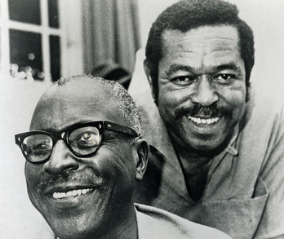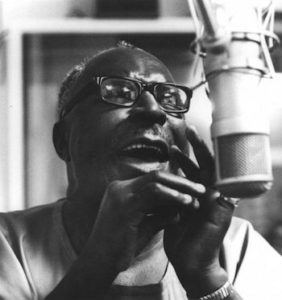Saunders Terrell (October 24, 1911 – March 11, 1986), known as Sonny Terry, was an American Piedmont blues and folk musician who was known for his energetic blues harmonica style, which frequently included vocal whoops and hollers and occasionally imitations of trains and fox hunts.
Terry was born Saunders Terrell in Greensboro, Georgia. His father, a farmer, taught him to play basic blues harp as a youth. He sustained injuries to his eyes and went blind by the time he was 16, which prevented him from doing farm work, and was forced to play music in order to earn a living. Terry played "Campdown Races" to the plow horses which improved the efficiency of farming in the area.
Realizing his eyesight would keep him from pursuing a profession in farming, Terry decided instead to be a blues singer. He began travelling to nearby Raleigh and Durham, North Carolina, performing on street corners for tips. In 1934, he befriended the popular guitarist Blind Boy Fuller. Fuller convinced Terry to move to Durham, where the two immediately gained a strong local following.
By 1937, they were offered an opportunity to go to New York to record for the Vocalion label. A year later, Terry would be back in New York taking part in John Hammond's legendary Spirituals to Swing concert, where he performed one of his memorable tunes, "Mountain Blues." Upon returning to Durham, Terry continued playing regularly with Fuller and also met his future partner, guitarist Brownie McGhee, who would accompany Terry off and on for the next two decades.
In 1938, Terry was invited to play at Carnegie Hall for the first From Spirituals to Swing concert, and later that year he recorded for the Library of Congress. He recorded his first commercial sides in 1940. Some of his most famous works include "Old Jabo", a song about a man bitten by a snake, and "Lost John", which demonstrates his amazing breath control.
Following Fuller's death in 1941, Terry and McGhee moved to New York. The change proved fruitful as they immediately found steady work, playing concerts both as a duo and solo. Despite their fame as "pure" folk artists, in the 1940s Terry and McGhee fronted a jump blues combo with honking saxophone and rolling piano, which was variously billed as Brownie McGhee and his Jook House Rockers or Sonny Terry and his Buckshot Five.
Terry became an in-demand session player who started showing
up regularly on the records of folk luminaries including Lead Belly, Woody
Guthrie, and Pete Seeger. An acting role was also initiated at this time, in
the long-running Broadway production of Finian's Rainbow in 1946. Terry & McGhee became well known among white
audiences during the folk music revival of the 1950s and 1960s. This included
collaborations with Styve Homnick, Woody Guthrie and Moses Asch, producing
classic recordings for Folkways Records (now Smithsonian/Folkways).
In the early '60s, the duo performed at numerous folk and blues festivals around the world, while Terry found time to work with singer Harry Belafonte and in television commercials. Terry was constantly travelling throughout the '70s, stopping only long enough to write his instructional book The Harp Styles of Sonny Terry.
It was by the mid-'70s, that the strain of being on the road developed into personal problems between McGhee and Terry. Unfortunately, they resigned their long partnership, divided by the bitterness of constant touring. Terry was still being discovered by a younger blues generation via the Johnny Winter-produced album Whoopin' for the Alligator label, featuring Winter and Willie Dixon. Winter had produced a comeback album for Muddy Waters (Hard Again) that helped rejuvenate his career, and he was attempting the same with Terry. By the '80s, Terry's age was catching up with him. He quit recording and only accepted sporadic live appearances.
Terry and McGhee were both recipients of a 1982 National Heritage Fellowship awarded by the National Endowment for the Arts, which is the United States government's highest honor in the folk and traditional arts.That year's fellowships were the first bestowed by the NEA.
Terry died of natural causes in Mineola, New York in March 1986. He was inducted into the Blues Hall of Fame in the same year.
(Edited from Wikipedia & AllMusic)








4 comments:
For “Sonny Terry – Complete Recordings 1938-1945 (2020)” go here;
https://krakenfiles.com/view/P7NEbCGclx/file.html
01 – Mountain Blues
02 – The New John Henry
03 – Fox Chase
04 – Lost John
05 – Train Whistle Blues
06 – New Love Blues
07 – Harmonica Blues
08 – Harmonica and Washboard Breakdown
09 – Harmonica Stomp
10 – Harmonica and Washboard Blues
11 – Forty-Four Whistle Blues
12 – Blowing the Blues
13 – Touch It up and Go
14 – John Henry
15 – Fox Chase 2
16 – Fox Chase 3
17 – The Red Cross Store
18 – Glory
19 – Lonesome Train
20 – Run Away Women
21 – Shake Down
22 – Sweet Woman
23 – Fox Chase 4
24 – Hard Luck Child
25 – We Just Can’t Agree
26 – My Baby Likes to Shuffle
Tracks 1 & 2 are from the "From Spirituals to Swing" concert at Carnegie Hall, 23 December 1938.
Recording date, location, matrix, catalog number:
1. December 23, 1938, Carnegie Hall, New York, (----), Vanguard VRS-8524
2. December 23, 1938, Carnegie Hall, New York, (----), Vanguard VRS-8524
3. December 24, 1938, Havers Studio, New York, 2490-A, Library of Congresss, (Archive of American Folk Song) AAFS-19
4. December 24, 1938, Havers Studio, New York, 2493-B, Library of Congresss, (Archive of American Folk Song) AAFS-19
5. December 28, 1938, New York, 23882-1, Columbia 417-M
6. December 28, 1938, New York, 23883-1, Columbia 417-M
7. March 5, 1940, New York, 26596-A, OKeh 05453
8. March 5, 1940, New York, 26597-A, OKeh 05453
9. March 6, 1940, New York, 26602-A, OKeh 05538
10. March 6, 1940, New York, 26603-A, OKeh 05538
11. June 19, 1940, Chicago, WC-3148-A, OKeh 05684
12. June 19, 1940, Chicago, WC-3149-A, OKeh 05684
13. October 23, 1941, New York, 31598-1, OKeh unissued
14. May 11, 1942, Washington, D.C., 6503-A-1, Library of Congress unissued
15. May 11, 1942, Washington, D.C., 6503-A-2, Library of Congress unissued
16. May 11, 1942, Washington, D.C., 6503-A-3, Library of Congress unissued
17. May 11, 1942, Washington, D.C., 6503-A-4, Library of Congress unissued
18. 1944, New York, Asch 432-2
19. 1944, New York, Asch 550-3
20. 1945, New York, S-5764-, Savoy 5549
21. 1945, New York, S-5765-, Savoy 5549
22. 1945, New York, SO-7-, Solo 10-004
23. 1945, New York, SO-8-, Solo 10-004
24. December 30, 1955, New York, WW-124-, Wing 90049
25. December 30, 1955, New York, WW-126-, Wing 90049
26. December 30, 1955, New York, (----), Wing unissued
This digital download is available from Amazon who fail to credit Document Records who first released this in 1994. This re-issue is by the “From The Valley” label (2020)
----------------------------------------------------------
For “Sonny Terry - Whoopin’ The Blues
~ The Capitol Recordings 1947-1950 (1995)” go here:
https://krakenfiles.com/view/5hH3wESYXU/file.html
1. Telephone Blues (3:25)
2. Custard Pie Blues (2:59)
3. Riff And Harmonica Jump (2:48)
4. Mad Man Blues (3:33)
5. All Alone Blues (3:07)
6. Dirty Mistreater, Don't You Know (2:45)
7. Early Morning Blues/Hot Headed Woman? (Medley) (2:49)
8. Whoopin' The Blues (2:43)
9. Beer Garden Blues (2:45)
10. Screamin' And Cryin' Blues (2:50)
11. Crow Jane Blues (2:35)
12. Worried Man Blues (2:42)
13. Airplane Blues (2:49)
14. Hot Headed Woman (3:12)
15. Harmonica Rag (2:27)
16. Leavin' Blues (2:58)
Recorded in 1947-50 sessions, these 16 tracks spotlight the singer/harmonica player as a soloist on gritty, country-influenced, sparsely accompanied blues. Terry, who died in 1986, was much better alone, though he’s best known for his collaborations with guitarist Brownie McGhee, which tend to have a more commercial sound.
For “Sonny Terry - 'Wizard of the Harmonica (Storyville 2020)” go here:
https://krakenfiles.com/view/WWOkz384jx/file.html
1. Digging My Potatoes 03:32
2. The Harmonica Blues 03:04
3. My Key Won't Fit No More 03:53
4. Chasing The Fox 02:28
5. Easy Rider 04:02
6. Goin' Down Slow 03:53
7. Take This Hammer 04:03
8. Old Lost John 03:08
9. I'm Crazy About Your Pie 02:57
10. Freight Train Rollin' On 02:15
11. Pretty Little Girl 02:32
12. Cousin John 02:42
13. I'm Afraid of Fire 03:26
The enthusiasm and captivating energy of Sonny Terry on 'Wizard of the Harmonica' is as tangible as undeniable as his impact on the blues harmonica and its role in the blues. Reissue of a 1972 LP featuring guitarist Brownie McGhee, Leif Johansson on washboard and drummer Svend-Erik Nrregaard.
Recorded in Copenhagen in 1971, 'Wizard of the Harmonica' captures Sonny Terry at a time in his life where his previous musical experiences and relationships form a foundation on which his uncompromising style unfolds with as few restrictions as ever. On "I'm Crazy About Your Pie", Terry delivers an exuberant take on Blind Boy Fuller's "Custard Pie", and the album's version of "Easy Rider" seems to harken back to how Lead Belly, another old friend and collaborator of Terry's, would perform it. Recorded in the later part of his career, 'Wizard of the Harmonica' depicts a 60-year-old Sonny Terry as vivid as ever but with a strong sense of the roots of his life and musical career.
Mucho material compartido del bueno, como es habitual. Muchas gracias.
Outstanding. Thanks.
Post a Comment